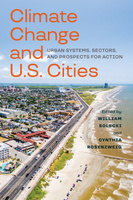William D. Solecki
Showing 1-2 of 2 items.
Prospects for Resilience
Insights from New York City's Jamaica Bay
Island Press
Given the realities of climate change and sea-level rise, coastal cities around the world are struggling with questions of resilience. Resilience, at its core, is about desirable states of the urban social-ecological system and working to sustain those states in an uncertain and tumultuous future. How do physical conditions, ecological processes, social objectives, human politics, and history shape the prospects for resilience? Most books set out “the answer.” This book sets out a process of grappling with holistic resilience from multiple perspectives, drawing on the insights and experiences of more than fifty scholars and practitioners working together to make Jamaica Bay in New York City an example for the world.
Ranging from a framework for understanding resilience practice in urban watersheds to essential tools for research and practice, Prospects for Resilience is filled with information and advice for scientists, urban planners, students, and others who are working to create more resilient cities that work with, not against, nature.
Ranging from a framework for understanding resilience practice in urban watersheds to essential tools for research and practice, Prospects for Resilience is filled with information and advice for scientists, urban planners, students, and others who are working to create more resilient cities that work with, not against, nature.
- Copyright year: 2016
Climate Change and U.S. Cities
Urban Systems, Sectors, and Prospects for Action
Island Press, NCA Regional Input Reports
From roads to clean water systems, the built infrastructure sustaining urban populations is increasingly vulnerable to climate. Understanding the dilemma and identifying a path forward is particularly important as cities are significant agents of climate action.
A follow-up to the Fourth National Climate Assessment (NCA), Climate Change and U.S. Cities documents the current and future climate risk for U.S. cities, urban systems, and their residents. It is an examination of research findings since early 2012, with a critical emphasis on the cross-cutting factors of economics, equity, and governance.
Urban stakeholders and decision makers will gain an understanding of climate risks and a set of conclusions and recommendations for action. Climate Change and U.S. Cities boldly lays out the tools that cities must harness to effect decisive, meaningful change.
A follow-up to the Fourth National Climate Assessment (NCA), Climate Change and U.S. Cities documents the current and future climate risk for U.S. cities, urban systems, and their residents. It is an examination of research findings since early 2012, with a critical emphasis on the cross-cutting factors of economics, equity, and governance.
Urban stakeholders and decision makers will gain an understanding of climate risks and a set of conclusions and recommendations for action. Climate Change and U.S. Cities boldly lays out the tools that cities must harness to effect decisive, meaningful change.
- Copyright year: 2021
Stay Informed
Subscribe nowRecent News


